But the results vary by generation. Gen Z, who are more exposed to digital technology, are the least optimistic generation, with only 47% believing their current employer will survive in the next decade. Meanwhile, 56% of Millennials share the same view, and are also the group most optimistic about their company’s growth prospects. This suggests that the younger generation of employees recognizes the need for change in their businesses to adapt to the future.
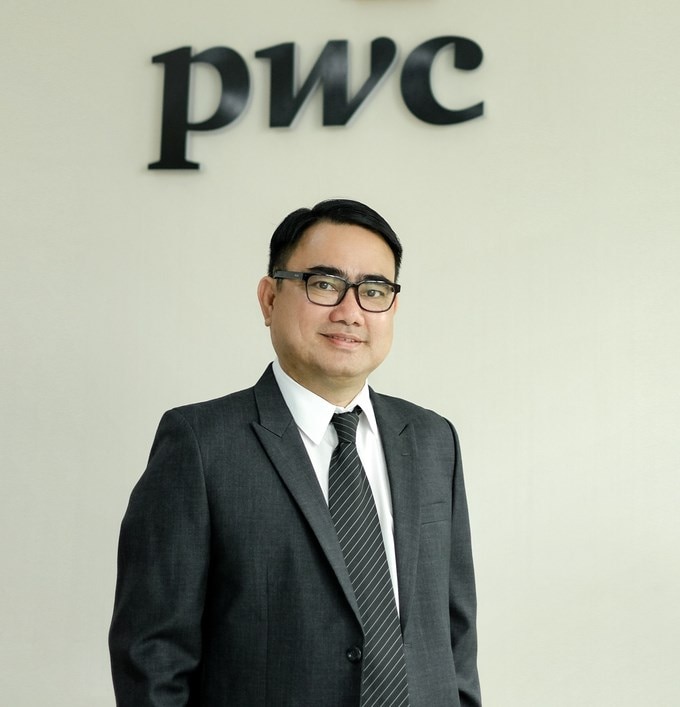 |
Mr. Mai Viet Hung Tran - General Director of PwC Vietnam.
Mr. Mai Viet Hung Tran, General Director, PwC Vietnam, commented: “Change is happening constantly in today’s turbulent reality. When leaders understand the waves of change in the workplace, they can boost employee motivation, tap into human potential and achieve greater goals. It is a good sign that Vietnamese leaders and employees have begun to embark on a transformation journey to adapt. Although the transformation in businesses is different, people are still at the core of change. We need to work together in new ways to build trust and deliver sustainable results.”
Organizations can only innovate successfully if their employees are deeply connected to the organization, motivated and eager to contribute. Are employees in Asia Pacific , including Vietnam, ready for this journey? PwC’s survey identified six factors that help strengthen employees’ readiness for innovation, including: business performance, employee sentiment, job skills, technology trends, work environment and climate action. These results will be useful recommendations for companies in the region, many of which have struggled with skills and talent shortages for years.
Increased employee confidence and expectations
Overall, job satisfaction among the workforce has not changed much over the years. However, there is a significant difference between countries in the Asia Pacific region. Developed economies such as Japan, South Korea, Hong Kong and Taiwan show lower levels of job satisfaction, with rates ranging from 29% to 45%. On the other hand, workers in Thailand, Indonesia, the Philippines, China and India show higher levels of job satisfaction, ranging from 70% to 79%. In Vietnam, 59% of workers are very satisfied or somewhat satisfied with their jobs, quite similar to the Asia Pacific average of 57%.
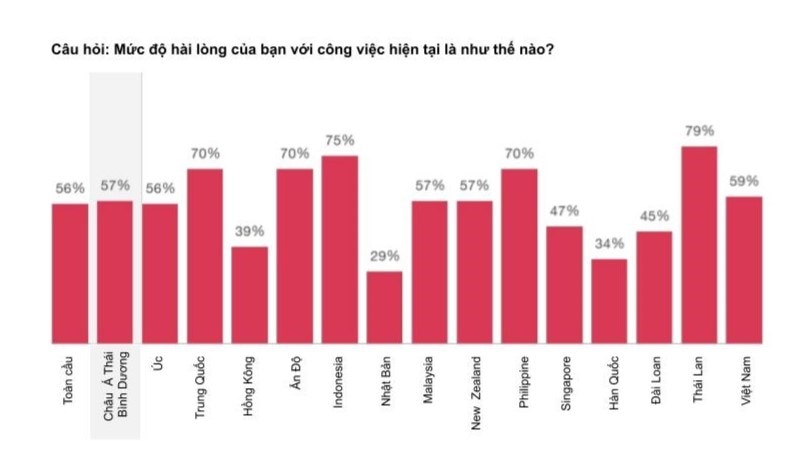 |
Significant differences in job satisfaction levels across countries in the Asia Pacific region
Around 40% of employees expressed their desire for a raise or promotion in the next 12 months. Workers in Vietnam were slightly less likely to ask for a promotion (34%) and change workplace (20%) than those in the Asia Pacific region. However, overall these numbers have increased by 7 to 10% compared to last year’s survey, indicating increased confidence among employees in asking for compensation or career opportunities. Younger generations (Gen Z and Millennials), senior executives and those working in large enterprises are more likely to ask for a raise, seek promotion opportunities or consider changing workplaces, motivated by things such as seeking new experiences, skills or opportunities to contribute more.
In addition, Vietnamese workers also showed a strong sense of urgency in pushing their employers to take climate action. 55% believe that their business has a responsibility to take measures to address climate change (compared to 41% in Asia Pacific) and 53% believe that their company is taking necessary actions to protect the environment (compared to 43% in Asia Pacific).
Affected by the gloomy economy
Globally, workers are facing financial hardship as economies falter and inflation rises. In Asia Pacific, while 76% of workers have just one job, one in four of the remaining workers hold two or more jobs, with significant variation across countries. This is higher than the global figure, where one in five people hold more than one job. Countries such as Vietnam, Thailand and Malaysia have higher rates of workers holding multiple jobs. In contrast, workers in Japan and China are predominantly single-job workers.
Corporate culture plays a vital role in the workplace. Unfortunately, not many managers promote a culture that embraces failure, innovation and experimentation, according to the survey. Only 32% of Vietnamese workers agree that their managers are generally understanding and do not punish minor mistakes, and 32% say they are encouraged to express their opinions and debate.
Additionally, providing feedback is essential to a transformational culture, and this is more prevalent in Vietnam than the Asia Pacific average. 68% of workers in Vietnam surveyed responded that they would actively seek feedback and make adjustments to improve their performance (compared to 53% in Asia Pacific). Older employees, such as Gen X and Baby Boomers, are less likely to engage in discussions and feedback than younger generations. However, senior managers are more likely to seek and provide feedback than non-managers.
People skills are considered the most important
In an ever-changing environment, the skills of workers will change a lot in the future. 61% of Vietnamese workers surveyed believe that their job skills will change significantly in the next 5 years and 59% believe that the organization where they work will provide them with opportunities to apply the skills most needed for their career in the next 5 years.
Workers consider people skills more important than technical or business skills, including adaptability/flexibility (70%), collaboration skills (70%), critical thinking (68%) and analytical/data skills (66%).
When asked to rate the viability of the business they work for, 54% believe their current organization will be around for more than 10 years, with Millennials being the most optimistic and Gen Z being the least optimistic. At the same time, 59% feel very satisfied or somewhat satisfied with their jobs, with 43% likely to ask for a pay rise in the next 12 months; 55% believe their employer has a responsibility to take steps to address climate change; 60% believe AI will help increase productivity and efficiency.
Furthermore, Vietnamese workers are very positive about the opportunities and benefits that Artificial Intelligence (AI) will bring to their careers. 60% believe that AI will help them increase their productivity/efficiency at work (Asia Pacific: 41%), and 58% see it as an opportunity to learn new skills (Asia Pacific: 34%).
 |
Workers in Vietnam are very confident about the opportunities and benefits that Artificial Intelligence (AI) will bring.
Industries such as Technology, Media and Telecommunications, and Financial Services see the greatest potential for productivity improvements through AI. Conversely, workers in Healthcare, Government, and the Public Sector assert that AI will not replace their roles.
As the workforce continues to evolve and their expectations change, a new leadership style is needed to guide organisations on the path to transformation. PwC suggests a number of solutions for employers and leaders to better understand their employees, unlock their potential and achieve greater organisational goals, including: Engaging employees in transformation; Leveraging artificial intelligence (AI); Taking a skills-based approach to organisational development; Uncovering untapped skills; Encouraging a culture of experimentation, innovation and embracing small failures; Ensuring that promotion decisions fully consider ‘soft skills’ and take a proactive approach to diversity and inclusion; Investing in transformational leadership./.
dangcongsan.vn


![[Photo] Ready for the top competitions of Vietnamese table tennis](https://vphoto.vietnam.vn/thumb/1200x675/vietnam/resource/IMAGE/2025/5/18/9c547c497c5a4ade8f98c8e7d44f5a41)

![[Photo] General Secretary To Lam visits exhibition of achievements in private economic development](https://vphoto.vietnam.vn/thumb/1200x675/vietnam/resource/IMAGE/2025/5/18/1809dc545f214a86911fe2d2d0fde2e8)











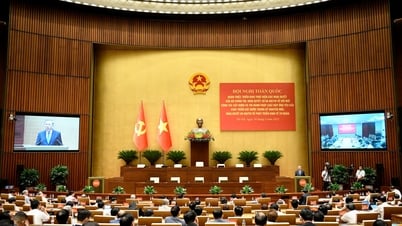







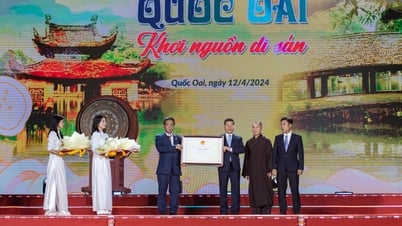

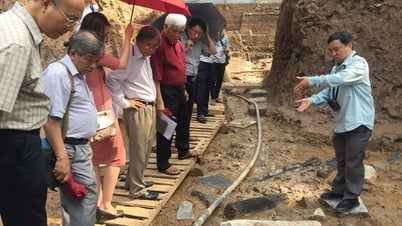


![[Photo] National conference to disseminate and implement Resolution No. 66-NQ/TW and Resolution No. 68-NQ/TW of the Politburo](https://vphoto.vietnam.vn/thumb/1200x675/vietnam/resource/IMAGE/2025/5/18/adf666b9303a4213998b395b05234b6a)










































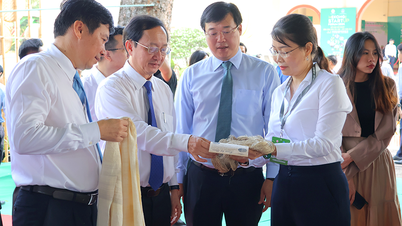













Comment (0)